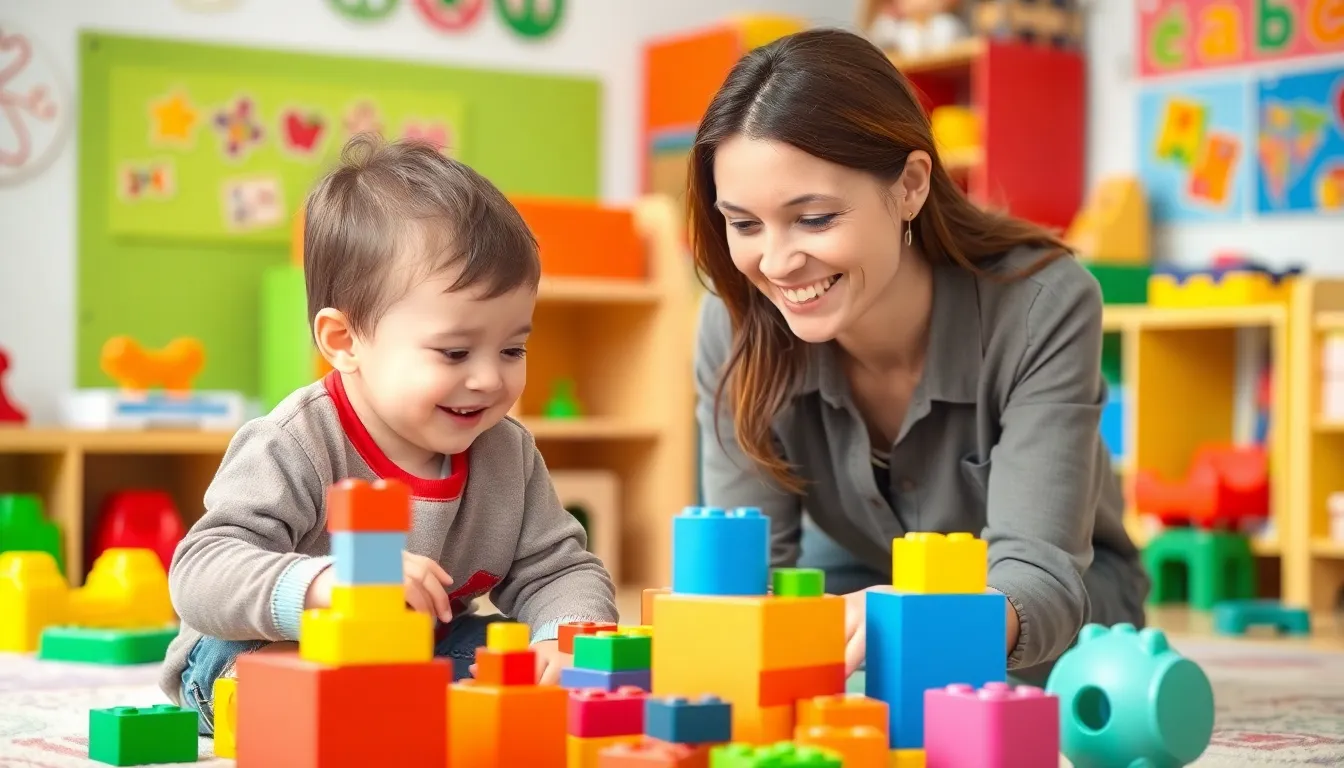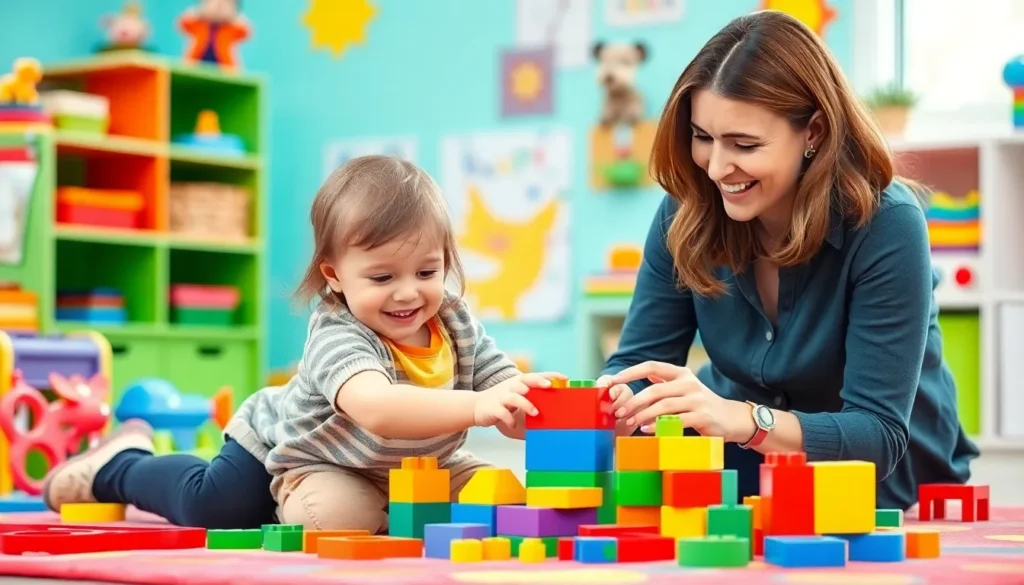Table of Contents
ToggleIn a world where every toddler seems to have the energy of a thousand suns, child development specialists are the unsung heroes. They dive into the delightful chaos of childhood, helping little ones navigate their emotional and cognitive growth. If you’ve ever wondered how to turn those tantrums into triumphs and those giggles into milestones, this job might just be your calling.
Overview of Child Development Specialist Jobs
Child development specialists focus on fostering the growth and well-being of young children. These professionals assess emotional and cognitive progress through various methods, creating tailored interventions to support individual needs. Responsibilities often include developing treatment plans, interacting with families, and collaborating with educators.
Diverse settings employ child development specialists, including schools, hospitals, and private practices. Specialists conduct workshops and training sessions to equip parents and teachers with strategies to support healthy development. Documentation of progress is crucial, allowing specialists to refine strategies based on what works best for each child.
Job requirements for child development specialists typically include a bachelor’s degree in child development, psychology, or a related field. Some positions require a master’s degree, particularly for roles in clinical settings. Certification may enhance job prospects and credibility.
Career opportunities abound in this field, with a projected growth of 17% from 2019 to 2029 according to the U.S. Bureau of Labor Statistics. Many professionals find fulfillment in witnessing the direct impact of their work on children’s lives. Fostering resilience and promoting positive behaviors becomes a central theme in this rewarding career path.
Challenges arise in child development specialist roles, especially in managing behaviors such as tantrums and anxiety. Adaptability remains essential for specialists as they navigate a wide range of developmental issues. Support from a multidisciplinary team can enhance the effectiveness of interventions.
Key Responsibilities of a Child Development Specialist


Child development specialists play a crucial role in fostering healthy emotional and cognitive growth in young children. They focus on specific responsibilities that enhance development outcomes.
Assessing Child Development
Child development specialists evaluate children’s progress using standardized assessments. They observe a child’s behavior and interaction patterns to identify strengths and areas needing improvement. Interpretation of assessment results helps in understanding developmental milestones. Monitoring a child’s progress regularly facilitates timely intervention and support. Specialists prioritize early detection of potential developmental delays to ensure appropriate resources are made available.
Creating Developmental Plans
Creating individualized developmental plans is essential for addressing each child’s unique needs. Specialists tailor these plans based on assessment results, aligning goals with the child’s capabilities. Implementing targeted strategies within these plans promotes specific areas of growth. Adjustments are made as necessary to reflect changes in the child’s needs. Regular documentation of progress enables specialists to refine approaches, ensuring effective interventions that support long-term developmental success.
Collaborating with Families and Professionals
Collaboration with families and other professionals enhances the effectiveness of interventions. Specialists engage in open communication with parents, providing them with insights into their child’s development. Coordination with educators and healthcare providers ensures a comprehensive support network. Organizing workshops for families and teachers equips them with strategies to reinforce learning at home and in school. Sharing progress updates fosters trust and encourages a collaborative approach to child development.
Required Education and Qualifications
Education and qualifications play a crucial role in the development of child development specialists. A strong foundation equips these professionals to support children’s emotional and cognitive growth effectively.
Degree Requirements
Most employers seek candidates with a bachelor’s degree in child development, psychology, or a related field. Some positions require a master’s degree for more advanced knowledge and skills. Coursework typically includes topics such as child psychology, developmental theories, and assessment techniques. Practical experience through internships or supervised fieldwork often enhances academic learning, providing valuable insights into real-world scenarios. Candidates possessing a graduate degree often access a wider range of opportunities and higher salary potential.
Certification Options
Certification options further bolster a specialist’s qualifications, making candidates more attractive in the job market. Organizations such as the National Association for the Education of Young Children (NAEYC) offer credentialing programs that validate expertise in early childhood education. Other certifications, like the Certified Child Life Specialist (CCLS), focus on child development in healthcare settings and require specific education and experience hours. Obtaining certification demonstrates commitment to the profession and ensures familiarity with best practices, enhancing career advancement opportunities.
Skills Essential for Success
Child development specialists require specific skills to thrive in their roles. Mastery of these skills greatly enhances their ability to support children’s growth.
Communication Skills
Effective communication plays a crucial role in this profession. Specialists engage with children, families, and educators to convey important information clearly. Developing tailored interventions depends on precise communication with parents regarding their child’s progress and challenges. Additionally, utilizing active listening fosters trust and nurtures relationships. This approach also aids in understanding children’s needs better, allowing for more effective strategies. Regularly participating in team meetings helps specialists stay coordinated with other professionals involved in a child’s development.
Empathy and Patience
Empathy is essential in understanding the unique challenges faced by young children and their families. Connecting with children on an emotional level allows specialists to respond appropriately to their needs. Practicing patience enables specialists to handle difficult situations, such as tantrums and anxiety, with calmness. Resilience is important in maintaining a supportive environment where children feel safe to express themselves. Acknowledging the small victories during a child’s developmental journey reinforces positive behavior and encourages continued progress. Keeping a balanced perspective helps specialists navigate the complexities of child behavior effectively.
Job Outlook and Salary Expectations
The job outlook for child development specialists shows strong growth potential. Employment in this field is projected to increase by 17% from 2019 to 2029, significantly higher than the average for all occupations. This growth reflects heightened awareness of the importance of early childhood development and the need for specialists to support children’s emotional and cognitive progress.
Salaries can vary based on several factors, including education, experience, and location. As of 2021, the median annual salary for child development specialists reached approximately $48,000. Positions in urban areas typically offer higher salaries due to increased demand for services. Specialists working in schools and private practices often receive competitive wages, while those employed by hospitals may have access to additional benefits.
Education plays a crucial role in salary potential. Bachelor’s degree holders in child development or a related field generally earn less than those with master’s degrees. Certification from organizations like the National Association for the Education of Young Children (NAEYC) can further enhance earning capacity and job prospects.
Various factors influence job satisfaction within this profession. Specialists who find fulfillment in witnessing the direct impact of their work on children’s lives often report high levels of job satisfaction. Challenges, such as managing difficult behaviors, can arise but typically enhance resilience and adaptability. Engaging with families and collaborating with educators fosters a supportive environment that contributes to positive career experiences.
Overall, aspiring child development specialists can expect promising career opportunities alongside competitive salaries. The increasing emphasis on early childhood education and development underscores the significance of this profession.





